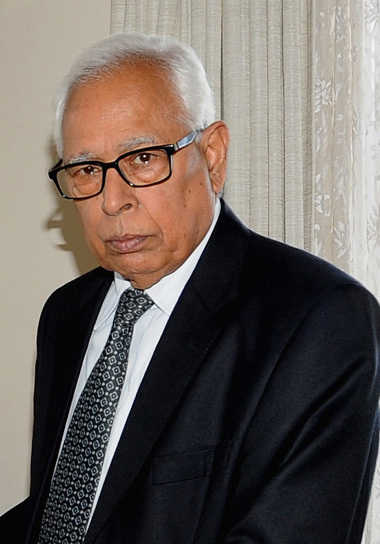
NN Vohra
Arun Joshi
Jammu and Kashmir is not a state anymore, but certain conventions set up by former Governor NN Vohra, who had the unique distinction of serving the state for more than 10 years, have become the guiding principles in stabilising politically fragile situations. These conventions are especially relevant when the voters throw a deeply fractured mandate.
This assumes significance in the light of the fractured mandate in Haryana and Maharashtra. The western state is still struggling to put its act together, as not only the voters have not given a clear mandate but also spotlighted the ideological clashes.
A similar situation had arisen in Jammu and Kashmir post the 2014 Assembly polls. The mandate was a challenge for the parties to find common ground. More important was the way Governor Vohra handled the situation and allowed the parties to take their time to settle their issues. He did not recommend the imposition of the Governor’s rule in the state until his hands were forced.
On December 23, 2014, the Assembly election results were out. The voters in J&K delivered a shockingly bewildering fractured mandate. The mandate was riven by a clash of political ideologies – self-rule versus complete integration with India.
The People’s Democratic Party emerged as the single largest party with 28 seats. The BJP was second with 25, NC won 15 and Congress 12 seats. There were seven others who made it to the House of 87. Then caretaker Chief Minister Omar Abdullah created a peculiar situation for the then Governor Vohra.
Within a couple of hours of his arrival in Delhi from London, Omar made a phone call to Vohra, who was also in the Union capital that time and handed over his letter of resignation, saying he was unable to continue in the post for he could not do anything to justify his continuation in the post. Vohra tried to persuade him, but Omar was adamant. The Governor who had expected that Omar would stay in the post till a new government was formed or, at least till February 25, 2015, the last day of the Assembly elected in 2008, was left with no option but to recommend the imposition of the Governor’s rule. The 2008 polls were also held under the watch of Governor Vohra.
Here are some snippets from the recent history, which show how Vohra handled the delicate situation with dexterity. He went by the constitutional norms and set up the conventions that, if followed, elsewhere in such a situation, would deliver a positive outcome.
Vohra was conscious how Pakistan was seeking to exploit the situation to create trouble in Kashmir, and within the state, there was impatience for the government to take shape.
In the fortnight that followed the declaration of the results, no party had come forward to stake claim to form government. Vohra had invited all the parties one by one. The PDP and BJP sought time and that was granted.
But Omar’s resignation forced his hands, he wrote to the President and after receiving the consent, imposed the Governor’s rule on January 9, 2015.
This episode recorded in the history of J&K has a second edition too. After the death of the first Chief Minister of the PDP-BJP coalition, Mufti Mohammad Sayeed, in January 2016, his successor was named as Mehbooba Mufti by the PDP legislators. Vohra was willing to administer oath of office and secrecy to her on January 7, 2016, itself after the burial of her father to avoid the state coming under the Governor’s rule. But Mehbooba declined.
Mehbooba was relentlessly reluctant for the next three months, leaving Vohra with no option but to impose the Governor’s rule. Finally, she assumed the office of Chief Minister on April 4, 2016. In the intervening period, he had shown his firmness in rejecting the suggestions of swearing-in a government of defectors assembled from various groups. That line he held even after Mehbooba Mufti resigned on June 18, 2018. He consulted all parties before placing the Assembly under suspended animation and placing the state under the Governor’s rule until June 20 last year.
Why this reference to J&K is crucial. The missteps in the past in this sensitive territory on the map of India were greeted with disastrous consequences. The dismissal of the Farooq Abdullah government in 1984 led to the rigged 1987 polls and subsequent eruption of militancy. Democracy was written off as J&K had to skip the 1991 parliamentary elections and the Assembly polls could not be held until the autumn of 1996. Vohra averted many such situations during his tenure for he stood for democracy and never allowed the state to slide into President’s rule all through his tenure as Governor from June 25, 2008, to August 22, 2018.
What happened thereafter is history now.



























